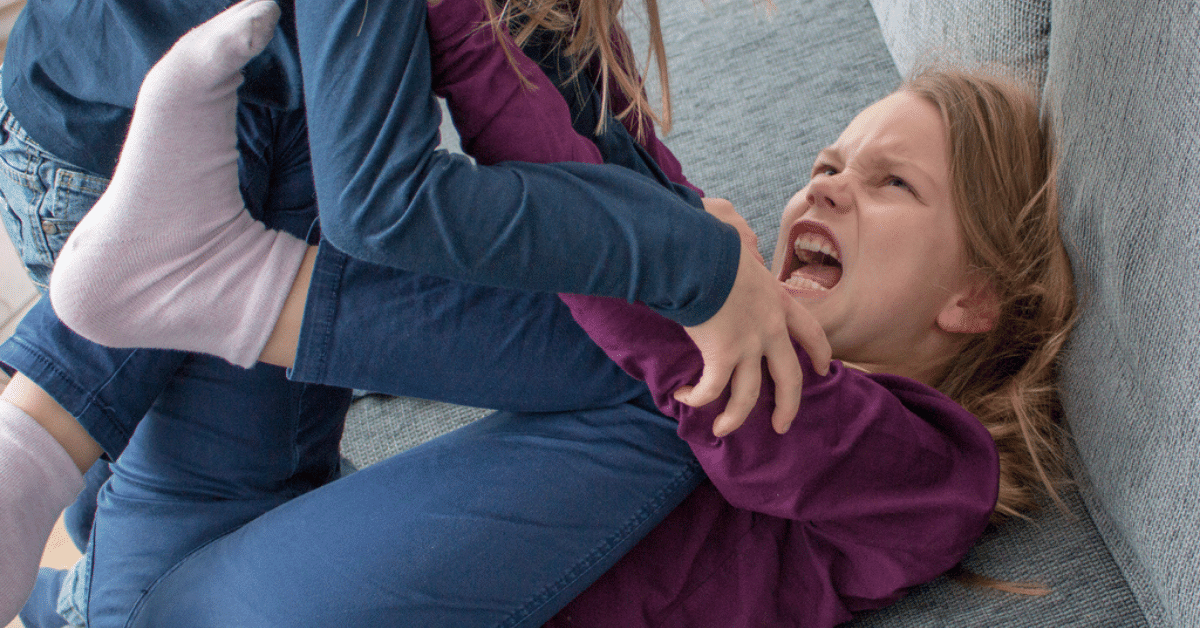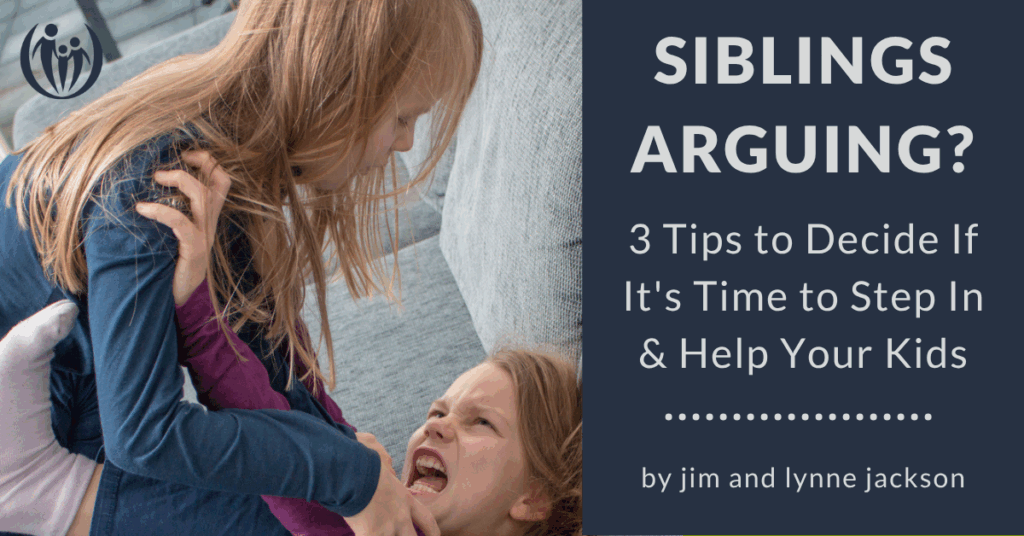
Siblings Arguing Again? 3 Tips to Decide If It’s Time to Step In & Help Your Kids

A brother or a sister is a wonderful thing. They can play together and grow up to be friends. Or… they can argue all day long. If you have siblings arguing in the house, it can become almost the soundtrack for certain seasons of life. Now the question is: what do you do?
Imagine you hear them in the next room and want it to stop. Now. Your children are having a heated debate that seems to be escalating by the minute. Should you intervene in sibling squabbles, or should you let them fight it out?*
As parents, we hope for our children (whether they are 2 or 22) to get along and be friends, but their fighting can seem like a constant, negative, and never-ending cycle. In our decades of coaching and teaching parents (and raising our own squabbling crew!), we have found a few guiding principles to help you steer your kids toward peace and connection at home.
Continue reading for three guidelines to help you wisely decide if intervention is necessary and ways to train your kids to require less intervention.
*Note: Take heart—it’s never too late to strengthen conflict resolution skills! One mom shared that after her teen daughters argued it took almost a week before they experienced genuine reconciliation. But it happened—and it was beautiful. All they needed was time to process their feelings and gentle encouragement from mom to express themselves where both felt truly heard. These life-giving principles work at any age—there’s always hope for deeper connection!
Tip #1: Only intervene in sibling arguments when it is obviously necessary
The temptation for many parents when they hear their children in conflict is to intervene quickly and make it stop. You want quiet. You want peace. You have things to do and don’t have time for this – again and again!
You can probably relate to Michelle in the story we share below. She had all those feelings when her two kids started fighting. Her 4-year-old daughter had been bugging her 6-year-old son, who was working on a project, and he was getting irritated with her.
When you see your kids arguing, there is a very real temptation to hush them up, send them to their rooms until they say sorry, and get on with the day. At best, your kids learn compliance. At worst, they will learn to insincerely say what they need to (lie) to get out of trouble. Either way, they will likely be at it again in no time.
What they won’t learn? How to resolve conflicts with others in a healthy way.
When we intervene too soon or too often, we cheat our children out of an excellent opportunity to learn lifelong negotiation and peacemaking skills.
When we intervene too soon or too often, we cheat our children out of an excellent opportunity to learn lifelong negotiation and peacemaking skills.
Let kids decide whether or not you should intervene in their fights
Michelle invited her kids to understand each other. “How are you each feeling right now?”
They answered, “Mad!” “Sad!”
She asked, “And do you want some help solving this, or can you solve it on your own?”
Because she had already provided them with some training on how to understand and resolve issues with each other, they were well-prepared. The kids looked at each other, looked at the project they were arguing about, and smiled back at Michelle. The 4-year-old announced, “We got it!”
She promptly looked at her older brother and said, “I’m sorry!”
He smiled, “I forgive you!” and they worked on their projects peacefully.
Can this actually happen? YES! This is a true story from one of our coaching clients. Taking the time to intentionally train your kids with the necessary skills can better equip them for a lifetime of conflict resolution. When they disagree with classmates, friends, co-workers, and their spouse, these skills will come in handy!
Prefer to Listen?
Check out Episode 237: Conflict Resolution for Kids: Take Advantage of Summer to Hone These Priceless Skills. If your kids are home for longer periods of time (summer, homeschool, spring break) you’ll want to tune in to this one.
Tip #2: Stay calm, neutral, and loving when you do need to intervene in sibling fights
On the way to helping your kids learn constructive conflict resolution, there are times when it’s necessary to intervene in a sibling fight.
Once you have made the decision that you need to step in, take a long, deep breath and enter the room with calm authority. Try not to judge who is the victim or who is the aggressive child. In a compassionate but firm voice, ask questions like: “Wow, you guys are really frustrated! Would you like some help here, or can you work it out?” or “What kind of help do you all need right now?”
Kids are more receptive in the moment if we lead them with questions rather than commands. (Of course, if one is on top of the other or fists are flying, you may need to physically separate them first.)
Do you need to intervene in a sibling fight?
Here are three typical situations when you should intervene:
- Physical altercation. Say, “Looks like you each need a little break in a comfy spot. When you are ready to use your words and not your hands, you can try again to work this out.”
- Verbal abuse or harmful statements that diminish value, such as: “You’re an idiot.” “No one likes you because you’re stupid.” “You’re a terrible basketball player anyway!” or “You’re such a loser!”
- Regular patterns of dominance and submission. This teaches hurtful habits and identity that can extend well into adult relationships.
Let’s unpack these three situations and how you can help.
Physical altercations
Let’s face it. Sometimes conflict gets physical. Kids hit. Kids bite. Kids push. Kids kick. When this happens, it is important to intervene quickly and calmly.
A mom in the Connected Families community tells this story:
“The other day, my girls were playing with Legos for quite a while. Quietly and without conflict. It was lovely! All of a sudden, I realized there was a pretty physical confrontation going on. What amazed me was how quiet it was. There was no shouting or arguing. Both girls stood, locked in combat, scratching, kicking, pushing each other, and quietly saying terrible things. At first, I panicked. I quickly and calmly walked over to where they were and separated them. I didn’t take sides. I didn’t ask questions. I just firmly said, without yelling, “We cannot use our hands when we are frustrated.” I had them both leave the Legos and settle down in different rooms. I remembered The Peace Process and how both parties need to be calm before discussing a conflict. Later on in the day, they were able to talk about it and come to a better understanding of where the other one was coming from.”
As the parent, it is important to remain steady and firm when intervening in physical altercations. Try not to yell or take sides. The overarching goal is to separate and, when things are more peaceful, facilitate reconciliation.
In our Sibling Conflict Online Course, we share the story of 7-year-old twin girls who had violent conflicts daily! And when their parents entered angrily to stop the conflict, the girls’ aggression would turn on them. With some parent coaching, they learned to approach the situation through the Connected Families Framework, and things began to change.
There were many relaxed, connected conversations with their girls at bedtime as these parents shared about their own sibling conflicts growing up. They also stressed the importance of the girls learning to separate when fighting so they didn’t get hurt and encouraged them about any small progress they saw. That started a healing process in the girls’ relationship, and in a few months, things were significantly different, and the girls were on a path to becoming the best of friends.
Verbal abuse or harmful statements
Name-calling between children is a challenge for many families. Once kids get on a roll of slinging names back and forth, it can seem like an express train to an emotional outburst. It’s tempting just to say, “Tell him you’re sorry. That is not okay!” But forcing an apology does not restore the relationship or teach true reconciliation skills.
Here are some ideas for how to intervene when verbal mud is being slung:
- Enter with empathy and a curiosity to understand what is going on. “Wow, those are some strong words! You must be really frustrated! How can I help?”
- Try to avoid taking sides. Sometimes you don’t know what happened before you entered the scene.
- Work to find a calming activity or distraction for everyone involved. Avoid trying to force reconciliation in the heat of the moment. Once kids are more peaceful, they are better able to make their words right.
- Some families find it helpful to implement four kind and true statements toward the person they had wronged to heal the hurt. Make it very clear (with your words and warm tone of voice) that it isn’t meant to be punitive but to encourage restored relationships. Lighthearted, even humorous facilitation of this was really helpful with our kids.
- Once they have made things right with each other, celebrate! This could be a hug, a high-five, or even a special snack. You can also encourage a fun activity they can do together.
The reality is this: Verbal abuse is as hurtful to the one speaking as it is to the one receiving. Often the one calling names is frustrated and discouraged about their own identity and is taking that out on someone else. They may feel even worse about themselves after they use those hurtful words.
It is vital to teach your kids (outside the “heat of the moment”) that their true identity can be found in their relationship with God. As kids receive your graceful encouragement and begin to believe their identity, they will be more open to making things right after verbally hurting someone. (You may even want to play this song on repeat!)
“Be kind and compassionate to one another, forgiving each other, just as in Christ, God forgave you.” Ephesians 4:32
Patterns of dominance and submission
Often when children are engaged in a dispute, one may be more dominant than the other. That child might be older, more physically dominant, or more intense, and the other child habitually concedes to make the conflict stop. Unfortunately, these patterns can repeat throughout someone’s lifetime if they aren’t addressed with an eye for the future.
For the more dominant child, find a time to talk with them in a way that addresses their higher calling. Find the gift that is in their dominance and help them use it for good! Ask questions like, “When you two disagree, how can we find solutions where everyone feels cared for?” Encourage their strong will and leadership while teaching the concept of compromise and achieving a win-win outcome. You can even practice with them by doing role plays to help them come up with their own script they can use to defuse tense situations.
The more submissive child might feel “stuck” and need guidance to learn the skills they need to speak up. When this happens, it is helpful to give that child a boost to equip them to find their voice. In a moment alone, role-play by being the dominant sibling and brainstorm scripts they can use to stand up for themselves. Ask questions to get the conversation started. Examples might be, “How does it feel when your sister always gets what she wants when you are fighting?” or “What do you think you would like to say to your sister, if you had a chance, about how you’re feeling?”
Whether your child is more dominant or more submissive, ask them both separately, “What skills do you think you have that can help this situation? How can we make sure you both feel good about how you solved your problem?”
Once you’ve worked through some of the answers to these questions, you can help encourage a quiet and safe atmosphere for them to talk when they are both calm. (If your child believes some of the hurtful things said during arguments, you can also offer strategies for sorting through some of the hurtful words said to them.) The goal? Build the values and skills kids need to speak up for themselves in a way that makes everyone feel cared for.
Tip #3: Train kids for conflict…outside of conflict
Our kids don’t usually “hear” us well when they are in the midst of their arguments. Their adrenaline is up, and they are seeking to win whatever battle they are fighting. Carve out time when your kids are well-rested and well-fed to teach them how to resolve conflict.
- Allow them to role-play and use any scripts they may have brainstormed.
- Teach them to ask you for help when they need it instead of just tattling.
- If an interaction ends poorly, you can use do-overs to re-do the conflict in a way that ends well.
Build a value of reconciliation and be a peacemaker
“Blessed are the peacemakers, for they will be called children of God.” Matthew 5:9
Just as Jesus Christ has made peace between us and God, we are walking in His footsteps when we facilitate peace and reconciliation with others. It’s a high calling. Do your kids know that? As you do the hard work to facilitate peace in your kids’ relationship, are you able to recognize that truth for yourself? There’s so much to learn about the depths of God’s love and grace as you work through conflict and begin to truly value reconciliation as a family.
Our kids’ fighting is the perfect opportunity for them to learn to bring grace and peace into their future relationships! Once we learn to embrace that, we can help them cultivate their gifts and find their voice to speak up for what they believe in. Who knows? You might have the next great peacemaker right under your own roof!
© 2017, 2021, 2025 Connected Families
In our online course, Sibling Conflict: From Bickering to Bonding, we teach parents how to teach kids The Peace Process. This process equips kids to work through their own arguments without your constant supervision and referring skills. Join us today!

Special July Offer
Join The Table this month and enjoy FREE access to our popular Sibling Conflict online course PLUS a free enrollment to share with another family.




